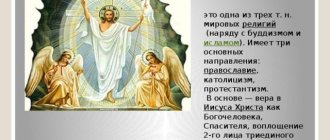Scripture speaks of the multitude of sins that are common to man. The Fathers of the Church, in turn, divided them into sins leading to death and those not leading to death, but in fact, every bad act leads to a deterioration in the spiritual health of a Christian. And, if he does not correct his path, it will ultimately lead to death (physical or spiritual).
For any wrongdoing, a person will be punished if he does not repent of it, and it is very important to understand and distinguish between these unrighteous acts. For example, is it a sin to gain financial gain in the wrong way? Orthodoxy calls this extortion and calls on people to repent, but is everything so bad?
Covetousness is a person’s desire to acquire material wealth.
Definition of concepts
There are several similar definitions that relate to obtaining any profit in the wrong way, by deception. Although synonymous, there are several different definitions for this:
Bad profit - acquiring profit or finances in a bad, unjust way. This should include any body kit or measurement that is done incorrectly and is a fraud. This definition is also suitable for earning money, which was carried out by inciting human passions.
This may include:
- cheating scales;
- false advantage;
- earnings from alcohol, cigarettes, gambling, pornography;
- falsification of documents or use of them;
- acquisition of stolen goods;
- parasitism (receiving a salary for a fictitious position).
Money-grubbing is an excessive love of money, obtaining “mshela” or self-interest. Those. the process by which a person extorts money or other benefits from himself.
This concept may include:
- extortion;
- corrupt practices;
- mindless hoarding;
- storing unnecessary things.
The Orthodox Church condemns bribery
Extortion is the process of violating human rights and freedoms, as a result of which physical benefits are obtained. This concept includes:
- illegal use of someone else's labor;
- making money from someone else's misfortune;
- borrowing money at interest;
- exhausting free or low-paid work.
Covetousness also has a broader concept - it is covetousness or greed, i.e. excessive love of finances, which pushes a person to do bad things. The Apostle Paul often writes about this passion in his letters to the Colossians and Jews.
More about sins in Orthodoxy:
- Why playing cards is a sin
- The sin of vanity and the fight against it
- About the sin of slander
Important! Regardless of what definition an act falls under, it is a sin, according to the Orthodox Church.
Bad profit
"Magician". Hieronymus Bosch
Nasty profitability –
This is a type of passion of love of money. Literally: making a profit in an unjust, nasty way, in the form of criminal gain. In the words of the Apostle Paul:
“... there are many disobedient, idle talkers and deceivers, especially those of the circumcision, whose lips must be stopped: they corrupt entire houses, teaching what they should not, for shameful gain... reprove them strictly, so that they may be sound in the faith” (Tit. 1, 10 - 13).
The phrase “out of shameful self-interest” translated into Old Church Slavonic means: “bad for the sake of profit.”
There are many examples of bad profit. In the 90s, when there was a redistribution of property in Russia, they bought vouchers for pennies, and fraudulently took ownership of entire enterprises, robbing people. What was built by our ancestors over decades was appropriated in a few months. Bad purchase? Without a doubt!
What else is bad profit about :
- Body kit and deception of buyers
- by changing the readings on the scales. - Making a profit
by satisfying or inciting sinful passions (causing evil to people) - involvement in gambling: casinos, cards, slot machines, bets on winnings. - Fraud
– forgery and/or use of counterfeit documents, diplomas, certificates, travel passes... - Buying stolen goods
- phones, things, equipment, gold items on the cheap. - Parasitism
- according to the Orthodox Catechism, if a person receives payment for something that he does not perform or does not perform properly and does not bring benefit, it is as if he is stealing both payment and benefit.
The acquisition will also be bad if people enrich themselves using their authority, official position, or, if it concerns the church, holy orders.
Addressing the Corinthians, the Apostle Paul is categorical:
“do not associate with those who bear the name of Christian and indulge in obvious vices, including covetousness, idolatry, predation, even do not eat with such, ... cast out the corrupt from among you” (Cor. 5: 9-12).
However, in the Gospel of Luke, in the parable of the chief publican Zacchaeus, the Lord says:
“Now salvation has come to this house, because he also is a son of Abraham, for the Son of Man came to seek and to save what was lost” ( Luke 19:9-10 ).
How did Zacchaeus please Jesus? Publicans often took advantage of their position and enriched themselves dishonestly, robbing and offending loved ones. The publican sincerely realized his guilt before people, in repentance he decided to give half of his property to the poor and repay four times those whom he had offended.
This means that those who come from bad things also have a chance of salvation.
Orthodox understanding
The Orthodox Church has strong convictions that covetousness is a sin, regardless of a person’s motives. If a person takes someone else’s property or appropriates the property of a loved one, he sins before the church and the Lord, and is covetous. The Bible characterizes this sin and speaks unequivocally about it.
The Bible condemns the sin of covetousness
The set of laws of Scripture (10 commandments) categorically say: “Thou shalt not steal,” and extortion, in its broad concept, can be classified as theft. There are many texts regarding this in Ecclesiastes and Proverbs.
About the Commandments:
- Commandment "Thou shalt not steal"
- "Do not make yourself an idol"
- Commandment “Do not remember the Lord in vanity”
Orthodox preachers completely agree with the Old Testament authors and talk about the sinfulness of bribes, making money from human passions and other unrighteous profits. Today, bribes and extortion surround a person from all sides (study, medicine, work, etc.), but this does not mean that these phenomena are normal or acceptable.
Important! According to church canons, a covetous person is a person who gives a bribe and who takes it. Thus, both parties are guilty of sin.
Both people violate the law of the Lord, and the Apostle Paul does not even recommend eating at the same table with this person.
Why is the sin of covetousness dangerous?
Any sin poisons a person’s spirit, and even a seemingly small offense, for example, a small weight gain when trading, can lead to serious consequences.
What motivates a person to deceive others in order to make money? Love of money. And like any passion, when it is satisfied, a person only further inflames this sinful desire in himself. Along the way, he suppresses his conscience, violates God's commandments and forgets about love for his neighbors. All this only leads to a deeper fall.
There are only 8 deadly sins listed in Scripture, but greed is one of them. And covetousness usually leads to passionate greed, because there is more and more money. In any case, there will be punishment, even if the person once deceived someone.
A covetous person breaks God's commandments and forgets about love for others
Likewise, money-grabbing has a corrupting effect on the human soul. This is rather a sin of poor people, because they begin to consciously accumulate many different things around themselves, which later turns into a serious passion. Any passion other than passion for the Lord and His word is considered sinful. So you should check yourself in acquiring objects, and not just in deceiving others. You should not make idols out of money or objects.
Extortion
Recently, waves of arrests have been taking place across the country, one after another, and even trials have already taken place in some cases, and people who in the recent past were endowed with such high ranks and titles are in custody that it was impossible to imagine that they would find themselves in such a position. But here we are. And there is only one reason for their presence in places not so distant - the notorious corruption, or bribery, or, in church language, covetousness, when a person strives to acquire material wealth insatiably and greedily, being carried away so much that violation of Divine and civil laws becomes part of his vicious habit.
What kind of phenomenon is this - covetousness?
Here we must immediately make a reservation that this concept is broader than, for example, corruption, and presupposes any unjust, predatory acquisition, any intemperance in the acquisition of earthly goods and pleasures. And this intemperance and greed for acquisitiveness, like any passion, growing in a person, over time completely takes possession of him and draws him to death, even if the person himself no longer realized or felt this. Passion leads a person to a kind of insanity, madness, when a person lives, thinks and acts in a state of obsession, and looks at the world through the eyes of passion, so that life appears before him in a distorted and sick, feverish form.
What is the “madness” of this passion? Yes, the fact is that a person doesn’t need much at all for a good and joyful life. So that he has a home, a loving wife, children, a job he loves, and most importantly, “faith working through love” (Gal. 5:6), as the Apostle Paul says about the main thing in the Christian life. And predation and theft and arrogance, greed and many other spiritual ulcers that accompany the passion of covetousness, gradually but steadily destroy a person’s life, no matter how representative and successful it may seem. Because, according to the words of the Savior, “a person’s life does not depend on the abundance of his possessions” (Luke 12:15). That is, the true quality of life, its fullness, purity and dignity are acquired at a high price, but this is not the price of covetousness, but the price of sacrificial love. And it is precisely faith, acting through love, that is called upon to help a person resist destructive passions. Even if the beginnings of certain passions are present in a person (and they are certainly present), then a person living by faith and love consciously restrains the action of these passions, fights them and strives in every possible way to completely eradicate them. This is largely the work and struggle of the Christian life.
And if a person, by virtue of his social status, upbringing, character and abilities, belongs, relatively speaking, to the family of human princes, that is, is capable of management, leadership, has administrative and economic abilities, he will most likely achieve a certain success and become like We say wealthy. And there is still no sin in this, because all people are different and everyone has their own cross and their own abilities and responsibilities before God and people. So, the duties of high-ranking people, the powerful of this world, are to serve God and people in conscience and take care first of all about this, and not about the endless increase of personal property. Just like the psalmist David said about this: “Even if wealth flows, do not apply your heart” (Ps. 62:11). That is, if, due to his position and type of activity, wealth really “flows” to a person, then he must know his measure of what is necessary, and use the rest wisely and zealously for the joy of people and for the benefit of the Fatherland. And this is only possible with the right mood of the heart, when a person understands that “current wealth” does not belong to him, but to God, who only entrusts it to this person as a manager. And what kind of steward he will turn out to be - wise or foolish - depends on how much good faith, acting through love, is inherent in him. Because how can a person allow himself to wallow in luxury when there is so much poverty and grief around him?! How can a person allow himself to steal, deceive and demand bribes if he “walks with God” in his conscience?! How can a person take bribes if he knows that real and pure joy is acquired only when we share with our neighbors, for the sake of Christ we give not only what is “beyond ours,” but if necessary, then our blood money.
One can even say that the main reason for all those misfortunes and troubles into which the noble people we are talking about fell into is the lack of experienced knowledge of what is real good and what is its substitute. For every sin and every passion is a substitute for true joy and real meaning. However, both believers fall and the virtuous sin, which again and again forces us to talk about the need to watch and pray, that is, to be extremely attentive to the motives of our inner life, compare them strictly with the truth of the Gospel, resist our evil aspirations and beg God about affirmation in true good.
Well, let’s leave the high-ranking men alone, let’s pray for them, so that the Lord will lead them to the knowledge of the truth and open the way for them to that real joy and goodness that will no longer be taken away from a person and which cannot be replaced by anything. But let's remember about ourselves. And this is exactly what I want to say. How sad it is to see when, both in the press and in other means of mass communications, regarding all the named “convictions” and “exposures” and punishments, instead of bitter compassion and self-reproach, a wave of some kind of shameful and malicious hooting rises. Dear ones, are we ourselves pure before God? Don’t the same passions operate in us, but perhaps less noticeable to others and, due to our position, less clearly manifesting themselves? And not only covetousness and money-grubbing, but also many other passions, no less destructive and criminal from the point of view of the law of God? And drunkenness, and fornication, and bitterness, and the same rapacity and greed, and deceit, and deception, and self-interest, and unbelief... Don’t we, as they say, “ordinary people” have all this? Yes, as much as you like and at every step! But with some strange rapture and even delight, having left “our dead”, that is, having ceased to mourn our sins, vices and passions, we embark on defamation and ridicule of people who have fallen, unlike us, in the public, so to speak, space , because passion took possession of them and brought them to obvious collapse. But listen, can’t the same thing happen today or tomorrow to each of us, even to the extent of our small situation? Yes, not only can it, but it will definitely happen, because everyone who imagines himself to be a judge, who does not see and does not mourn his sins, and even mocks the fallen, will certainly have to endure shame, humiliation, and shame, according to the word of the Lord: “Everyone who exalts himself will be humbled” (Luke 14:11). So let’s leave this dangerous and soul-harmful activity - washing other people’s bones, especially since we still know and understand little about the actual circumstances of certain cases, but only follow the voice of the media, greedy for sensations.
Here it is appropriate to recall the “iron rule” of the holy fathers: condemn the sin, but have pity on the person. Undoubtedly, the fight against corruption at the state level must continue. But it is important that we recognize this truly necessary and important struggle not as settling scores with “snickering grabbers,” but as our common misfortune of spiritual and moral impoverishment. Because these officials were not brought to us secretly from outside, like a detachment of saboteurs, but they grew up in our Fatherland, wounded and wounded by the former atheism and the current permissiveness, a false understanding of freedom and good. And we all need to correct ourselves together, in a common awareness of our guilt and personal contribution to the creation or destruction of a good life.
In order for a generation of good rulers to grow up, it is necessary to teach people from childhood to live according to the commandments of God
But here’s something else I’d like to say. Having prayed for the admonition and correction of the fallen, and wept over our sins, let us remember that it is in our power to take care of preventing such falls and catastrophes in the future. Namely: it is our duty to preach, evangelize and teach children and youth, including those who will come to power tomorrow and will, in one way or another, manage the countless riches of the country and people. Teach them that there is no other higher joy in life than “righteousness and peace and joy in the Holy Spirit” (Rom. 14:17), which we call the Kingdom of Heaven. By righteousness we here mean a life in harmony with God, by peace - a special state of soul arising from this life, and by joy - a clear awareness of participation in the Holy Spirit, born in repentance and patient creation of good. And this principle, affirmed in the soul since childhood as a cornerstone, will allow us, over time and in power, to see worthy, responsible, merciful and compassionate people. Those who can be called wise and God-loving princes. And if we want a generation of such good rulers and stewards to come over time, then we must now ourselves try to live according to our conscience, struggling with our passions and fulfilling the commandments of God to the best of our ability, and teach this to our children. Tell them about basic but necessary rules of spiritual safety. About the destructive and destructive power of passions, about the need for a conscious struggle against them, about the highest calling of man, about affirmation and growth in virtue. This is the foundation of our common future, and any other foundation is unsteady, like sand, and is fraught with many falls and disasters, because human truth is vain and changeable, but God’s truth endures forever.
Story
History is impossible without a root cause. Bribery is something that has been inherent in people from the very beginning of time, but over the centuries, unfortunately, it has only gained momentum. Of course, the law strictly punished those who took bribes, but even punishment stopped few people. Most often, the punishment was too simple and insufficient to achieve the intended goal - once and for all to discourage a person from taking bribes.
The state apparatus itself dictated such conditions that it was very difficult to resolve many issues without outside help. Naturally, no one was going to provide such help “for thank you.” Moreover, we must not forget the fact that society itself considered honest people who do not take money and conduct business “in accordance with their conscience” as simpletons, fools and fools. They were used very often, and few people thought they were smart.
This example clearly shows how public opinion influences a specific person. The majority became the same as everyone else, even if this contradicted their life and moral principles. Alas, we perceive the opinion of society as more significant than our own point of view. And only a few could resist universal bribery, but every year there were fewer and fewer such people. Unfortunately, bribery is a phenomenon that, once “stained” with it, it is impossible to “wash off” later.
Prayers for deliverance from passions
Prayer of Ignatius Brianchaninov in the passion of love of money and hope for earthly acquisitions
Lord, You visit and accept sinners! And you raise the dead! And you command the waters of the sea, the winds of the sky! And the loaves grow miraculously in Your hands, giving a thousand-fold harvest - they are sown, reaped, baked and broken at the same time, in one instant! And You hunger to deliver us from famine! And You long for our thirst to go away! And you travel through the country of our exile, straining Yourself to return to us the calm, heavenly nature filled with sweets that we have lost!
You shed Your sweat in the Garden of Gethsemane, so that we stop shedding our sweat in obtaining bread, and learn to shed it in prayers for worthy communion of the Heavenly Bread. The thorns that the cursed earth produced for us, You took upon Your head; Thou hast crowned and bruised Thy most holy head with thorns! We have lost the heavenly tree of life and its fruit, which imparted immortality to those who ate it. You, prostrate on the tree of the cross, became for us the fruit that bestows eternal life on your partakers. Both the fruit of life and the tree of life appeared on earth in the camp of our exile. This fruit and this tree are superior to those of paradise: they communicated immortality, and these communicated immortality and Divinity.
Through Your suffering You have poured sweetness into our suffering. We reject earthly pleasures, we choose suffering as our lot, just to become partakers of Your sweetness! It is like a foretaste of eternal life, sweeter and more precious than temporary life! You fell asleep in the sleep of death, which could not keep You in eternal sleep, You - God! You rose up and gave us excitement from this dream, from the cruel sleep of death, gave us a blessed and glorious resurrection! Thou hast lifted up our renewed nature into heaven, and seated it at the right hand of the eternal, co-eternal with You, Thy Father! Our Lord! Grant us both on earth and in heaven to glorify, bless, and praise Your goodness! Grant us with a frank face to behold Your terrible, unapproachable, magnificent Glory, to behold It forever, to worship It and bliss in It. Amen.
Prayer to the martyr Boniface for deliverance from drunkenness
Oh, long-suffering and all-praised martyr Boniface! We now resort to your intercession. Do not reject our prayers, but graciously hear us. Heal our brothers and sisters (names), who are overcome by the serious illness of drunkenness, and for the sake of their mother, the Church of Christ, and the eternal salvation that is falling away.
Oh, holy martyr of Christ, touch their hearts with this grace given from God, quickly raise them from the falls of sin and bring them to saving abstinence. Pray to the Lord God, for whose sake you also suffered, that having forgiven us our sins, may He not turn away His mercy from His people, but may He strengthen us in sobriety and chastity, may He help His right hand For those who are sober, to keep their saving vow to the end, and in the days and in watch for Him at night and give a good answer about Him at the Last Judgment.
Accept, O saint of God, the prayers of mothers who shed tears for their children; honest wives, weeping for husbands; children of the orphaned and wretched, abandoned by drunkards; all of us who fall to your icon, may this cry come through your prayers to the Throne of the Most High. Cover and keep us from the evil deception and all the snares of the enemy. In the terrible hour of our exodus, help us to pass through the airy ordeals without stumbling, with your prayers deliver us from eternal condemnation, and may the mercy of God cover us, forever and ever. Amen.
Prayer of the Venerable Mary of Egypt in the War of Fornication
Oh, great saint of Christ, Reverend Mary! In Heaven you stand before the Throne of God, but on earth you are with us in the spirit of love, having boldness in the Lord, pray to save His servants, who flow to you with love. Ask us from the Most Merciful Master and Lord of faith for immaculate observance of our cities and villages, for deliverance from famine and destruction, for those who mourn - consolation, for those who are sick - healing, for those who have fallen - rise knowledge, strengthening for those who go astray, prosperity and blessing for good deeds, orphans and widows - intercession and eternal rest for those who have departed from this life, but on the day of the terrible Judgment, at the right hand of the land, we will all hear the blessed voice of the Judge of the world: come, blessed of My Father, us follow the kingdom prepared for you from the foundation of the world, and you will abide there forever. Amen.
Read us conveniently on social networks:
Tags: extortion what is it, extortion what is it in Orthodoxy, extortion is it
Let's sum it up
Such internal work is very useful, because if you receive undeserved income, then there is a danger of multiplying sins. Another person may find out what money-grabbing is and succumb to this temptation too: begin to accumulate unnecessary property, fall under the power of objects and the material world.
These vices are more than typical of modern times: bribery, which leads to excessive consumerism, the search for personal gain in order to acquire large property, which is often not particularly needed.
It is now important for an Orthodox person to have a clear understanding of sin and a clear personal position in relation to unrighteous activities.
VKontakteOdnoklassnikiFacebookTwitterMy world
Vice "money-grabbing"
Along with extortion, there is also the concept of extortion.
This sin means an addiction to buying more and more new things or certain goods that a person does not need, but acquires them out of greed.
If we break down the word “moss-taking” into its components, we get from the Old Russian language “mshel”, which means a thing and “mshelo”, which means to be covered with moss.
From here it is literally understood that the sin of moss-taking is the accumulation of things that are already “covered with moss,” but they are all kept and not thrown away. It is noteworthy that one can trace a peculiar connection between extortion and extortion: a person, receiving more and more money, buys more and more things that he does not need, to demonstrate his status.
However, there is a cure for this “illness” . To get rid of unnecessary “mshel”, it is necessary to carry out monthly audits in places of residence and simply throw away things that are not needed or give them to someone who really needs them.
The benefits of giving up sin
According to the instructions of the righteous, the holy scriptures, righteous work is an integral part of our life. Even the holy elders, who spent a lot of time in spiritual work, also worked to provide for themselves.
Moreover, they deliberately tired their flesh and occupied their own minds, they always strived for work and some useful work.
Modern society can corrupt and lead to a lack of useful and righteous work.
However, if you know covetousness, what kind of sin it is and how it manifests itself, then it will not be difficult to adjust some of your own thoughts and behavior for the benefit of the soul.
This is interesting! Who is Saint Luke of Crimea and how does he help?
To renounce a sinful thought, you should choose a suitable occupation for yourself that brings normal income and does not contradict the tenets of faith.
In addition, you should not look for additional dubious sources of income, for example, speculate on something or play the lottery. You need to realize the almost complete equality between extortion and theft of other people's property, and not be like sinners.










